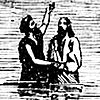Portal:Christianity
 Religion
Religion
Atheism- Creationism
- Mythology
- Nontheism
- Occult
- Spirituality
African (Serer) - Bábism (Bahá'í Faith)
-
 Buddhism (Mahayana
Buddhism (Mahayana - Tibetan
- Vajrayana)
- Chinese (Confucianism
- Falun Gong
- Taoism)
-
 Christianity (Bible
Christianity (Bible - in China
- in India
- Saints)
- Seventh-day Adventism
- Anabaptism
 Anglicanism
Anglicanism- Arminianism
- Baptist
- Calvinism
- Christadelphianism
- Eastern (Oriental Orthodoxy
- Syriac)
- Latter Day Saints (Book of Mormon
- LDS Church
- Community of Christ)
- Lutheranism
- Methodism
- Roman Catholicism (Pope)
- Heathenism
- Hellenismos (Greek mythology)
- Indian (Ayyavazhi)
 Hinduism (mythology
Hinduism (mythology- Ravidassia)
- Jainism
- Sikhism
-
 Islam (in China
Islam (in China - in Russia
- Shia
- Ahmadiyya
- Sufism
- Quran)
- Judaism (Kabbalah)
-
 Scientology
Scientology - Shinto
- Wicca
- Zoroastrianism
Showcased Christianity contentChristianity is a monotheistic religion based on the life and teachings of Jesus Christ. It is the world's largest religion, with over 2.4 billion followers, known as Christians. Christians believe that Jesus is the Son of God and the savior of humanity whose coming as the Messiah (the Christ) was prophesied in the Old Testament. Christian theology is summarized in various creeds. These professions of faith state that Jesus suffered, died, was buried, descended into hell, and rose from the dead, in order to grant eternal life to those who believe in him and trust in him for the remission of their sins. The creeds further maintain that Jesus bodily ascended into heaven, where he reigns with God the Father in the unity of the Holy Spirit, and that he will return to judge the living and the dead and grant eternal life to his followers. His incarnation, earthly ministry, crucifixion, and resurrection are often referred to as "the gospel", meaning "good news". The term gospel also refers to written accounts of Jesus's life and teaching, four of which—Matthew, Mark, Luke, and John—are considered canonical and included in the Christian Bible. Christianity began as a Second Temple Judaic sect in the mid-1st century. Throughout its history, the religion has weathered schisms and theological disputes that have resulted in many distinct churches and denominations. Worldwide, the three largest branches of Christianity are the Catholic Church, the Eastern Orthodox Church, and the various denominations of Protestantism. The Catholic and Eastern Orthodox churches broke communion with each other in the East-West Schism of 1054; Protestantism came into existence in the Reformation of the 16th century, splitting from the Catholic Church. Selected article
Christian views on alcohol are varied. Throughout the first 1,800 years of church history, Christians generally consumed alcoholic beverages as a common part of everyday life and used "the fruit of the vine" in their central rite—the Eucharist or Lord's Supper. They held that both the Bible and Christian tradition taught that alcohol is a gift from God that makes life more joyous, but that over-indulgence leading to drunkenness is sinful or at least a vice.
In the mid-19th century, some Protestant Christians moved from a position of allowing moderate use of alcohol (sometimes called moderationism) to either deciding that not imbibing was wisest in the present circumstances (abstentionism) or prohibiting all ordinary consumption of alcohol because it was believed to be a sin (prohibitionism). Many evangelical churches, particularly the Methodists, advocated abstentionism and were early leaders in the temperance movement of the 19th and 20th centuries. Today, all three of these positions exist in Christianity, but the historic position remains the most common worldwide, due to the adherence by the largest bodies of Christians, namely Anglicanism, Roman Catholicism, and Orthodoxy. Selected scriptureDid you know...
Selected biography
Ælfheah (954 – 19 April 1012; Old English: Ælfhēah, "elf-high"), officially remembered by the name Alphege within the Church, and sometimes called Alfege, was an Anglo-Saxon Bishop of Winchester, later Archbishop of Canterbury. He became an anchorite before being elected abbot of Bath Abbey. His perceived piety and sanctity led to his promotion to the episcopate, and eventually to his becoming archbishop. Ælfheah furthered the cult of St Dunstan and also encouraged learning. He was captured by Viking raiders in 1011 and killed by them the following year, after refusing to allow himself to be ransomed. Ælfheah was canonized as a saint in 1078. Saint Thomas Becket, a later Archbishop of Canterbury, prayed to him just before his own slaying in Canterbury Cathedral.
Selected pictureThe Life of Christ as a narrative cycle in Christian art comprises a number of different subjects, which were often grouped in series or cycles of works in a variety of media, narrating the life of Jesus on earth, as distinguished from the many other subjects in art showing the eternal life of Christ, such as Christ in Majesty, and also many types of portrait or devotional subjects without a narrative element. TopicsRelated portals
Associated Wikimedia
|




























